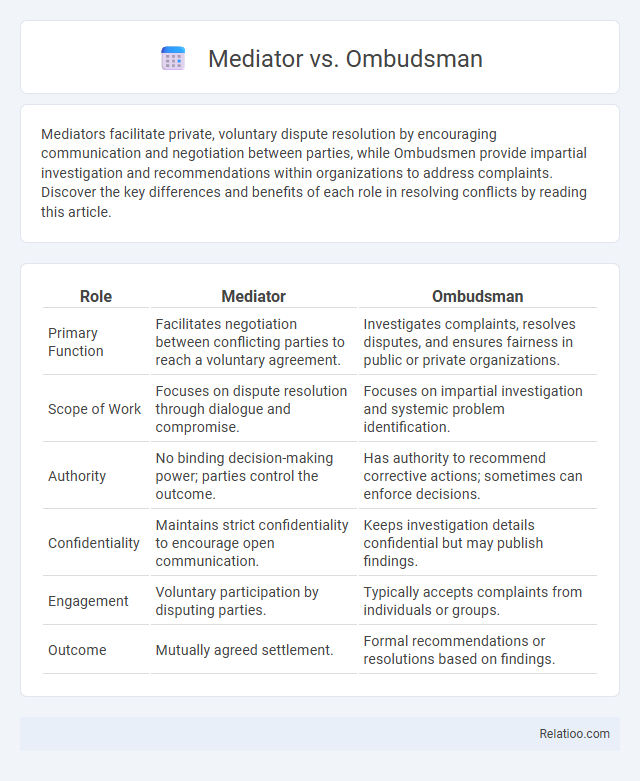Mediators facilitate private, voluntary dispute resolution by encouraging communication and negotiation between parties, while Ombudsmen provide impartial investigation and recommendations within organizations to address complaints. Discover the key differences and benefits of each role in resolving conflicts by reading this article.
Table of Comparison
| Role | Mediator | Ombudsman |
|---|---|---|
| Primary Function | Facilitates negotiation between conflicting parties to reach a voluntary agreement. | Investigates complaints, resolves disputes, and ensures fairness in public or private organizations. |
| Scope of Work | Focuses on dispute resolution through dialogue and compromise. | Focuses on impartial investigation and systemic problem identification. |
| Authority | No binding decision-making power; parties control the outcome. | Has authority to recommend corrective actions; sometimes can enforce decisions. |
| Confidentiality | Maintains strict confidentiality to encourage open communication. | Keeps investigation details confidential but may publish findings. |
| Engagement | Voluntary participation by disputing parties. | Typically accepts complaints from individuals or groups. |
| Outcome | Mutually agreed settlement. | Formal recommendations or resolutions based on findings. |
Understanding the Roles: Mediator vs Ombudsman
A mediator facilitates communication and negotiation between disputing parties to help them reach a voluntary agreement, often in legal, commercial, or family contexts. An ombudsman serves as an impartial public official who investigates complaints, ensures fair practices, and resolves conflicts within organizations or government entities. Understanding these distinct roles clarifies when to engage a mediator for direct negotiation or an ombudsman for addressing systemic issues and organizational grievances.
Key Definitions and Core Functions
A mediator facilitates negotiation between disputing parties to reach a voluntary agreement, emphasizing confidentiality and neutrality. An ombudsman investigates complaints against organizations, ensuring accountability and recommending corrective actions without imposing decisions. While both roles aim to resolve conflicts, mediators guide parties directly in settlement discussions, whereas ombudsmen serve as impartial intermediaries addressing systemic issues and policy enforcement.
The Mediation Process Explained
The mediation process involves a neutral third party facilitating a structured dialogue between disputing parties to reach a mutually acceptable agreement. Unlike an ombudsman, who investigates complaints and may recommend solutions based on fairness and policy, a mediator guides Your communication and negotiation without imposing decisions, fostering cooperation and understanding. This process emphasizes confidentiality, voluntary participation, and creative problem-solving to resolve conflicts efficiently.
How Ombudsman Services Operate
Ombudsman services operate as independent, impartial entities that investigate complaints between consumers and organizations, offering impartial resolution without legal proceedings. Your concerns are addressed through confidential mediation and recommendations that aim to ensure fairness and accountability in public or private sectors. Unlike mediators who facilitate negotiation directly between disputing parties, ombudsmen focus on systemic issues and enforce resolutions through influence rather than binding authority.
Main Differences: Mediator vs Ombudsman
A mediator facilitates negotiation between disputing parties to reach a voluntary, mutually acceptable agreement, often in private and informal settings. An ombudsman acts as an independent, impartial official who investigates complaints, addresses grievances, and ensures fair administration within organizations or government agencies. Unlike mediators, ombudsmen have the authority to recommend corrective actions but do not directly negotiate settlements between parties.
Common Applications in Conflict Resolution
Mediators facilitate negotiation between disputing parties to reach a mutually agreeable solution, commonly used in family law, workplace conflicts, and commercial disputes. Ombudsmen address complaints by investigating issues within organizations such as universities, corporations, or government agencies, ensuring fairness and adherence to policies. Your choice depends on the context: mediators are ideal for collaborative problem-solving, while ombudsmen provide impartial oversight and resolution for systemic grievances.
Qualifications and Professional Standards
Mediator qualifications typically include formal training in conflict resolution and certification from recognized bodies such as the Association for Conflict Resolution, emphasizing neutrality and communication skills. Ombudsmen are often required to have extensive experience in law, public administration, or social work, along with adherence to strict codes of confidentiality, impartiality, and ethical standards set by organizations like the International Ombudsman Association. Your choice should consider whether you need a mediator's focus on facilitating negotiation or an ombudsman's role in addressing complaints with professional accountability and regulatory compliance.
Benefits and Limitations of Each Role
Mediator facilitates voluntary negotiation between disputing parties, promoting collaborative solutions and preserving relationships; however, it relies heavily on party cooperation and lacks authority to enforce agreements. Ombudsman provides impartial investigation of complaints, offering an accessible avenue for conflict resolution with official oversight, yet may have limited power to impose binding decisions. Arbitrator delivers a binding resolution based on evidence and legal principles, ensuring finality and enforcement but sacrificing flexibility and the opportunity for creative, mutually agreeable outcomes.
Choosing Between a Mediator and an Ombudsman
Choosing between a mediator and an ombudsman depends on the nature of the dispute and the desired resolution process. Mediators facilitate structured negotiation between parties to reach a mutually agreeable solution, often in contractual or interpersonal conflicts. Ombudsmen act as neutral investigators within organizations, addressing complaints and ensuring fairness without the formal negotiation process typical of mediation.
Frequently Asked Questions (FAQs)
FAQs about Mediator, Ombudsman, and Moderator clarify their distinct roles in dispute resolution: Mediators facilitate negotiation between parties to reach a voluntary agreement, Ombudsmen investigate complaints and recommend solutions often within organizations, while Moderators manage online or in-person discussions to ensure respectful and orderly communication. Your choice depends on the context--Mediators excel in contractual or interpersonal disputes, Ombudsmen suit organizational grievances, and Moderators maintain group dynamics. Understanding these differences helps you select the right professional for effective conflict management and resolution.

Infographic: Mediator vs Ombudsman
 relatioo.com
relatioo.com